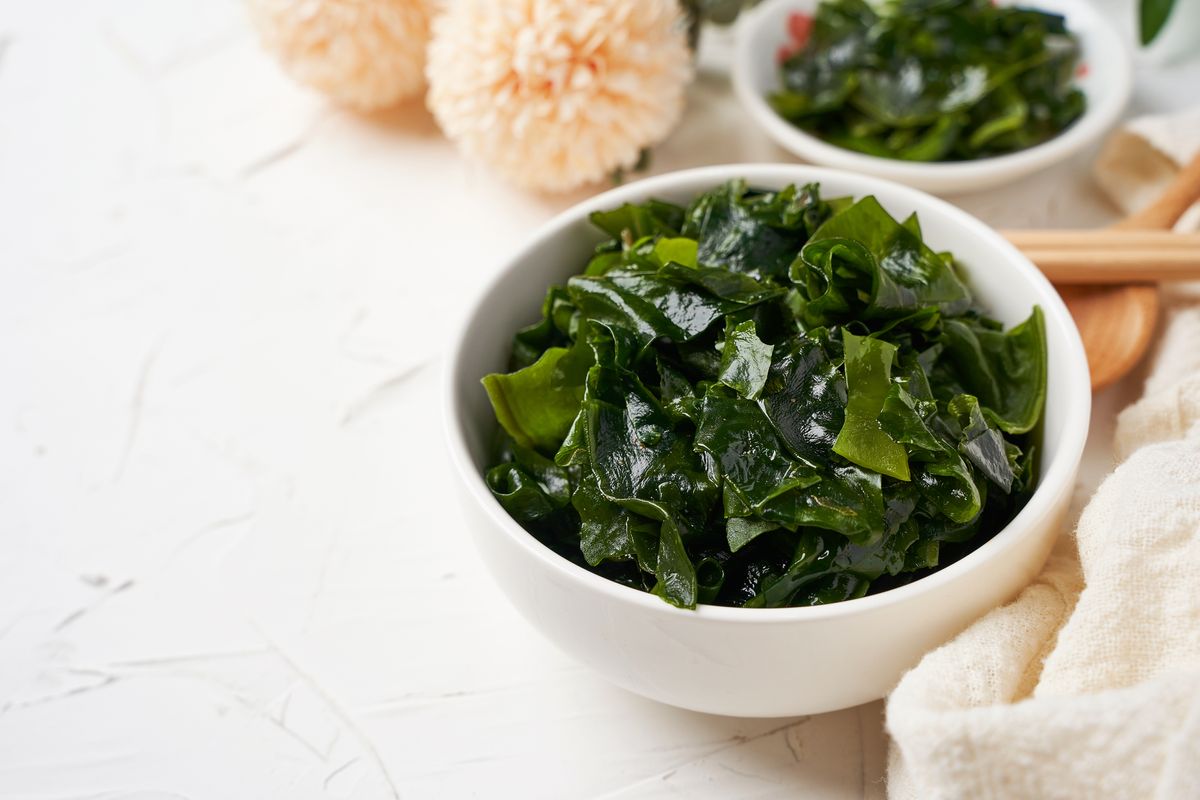Seaweed, commonly known as "sea lettuce," is not just the floating greenery you see in the ocean. It has been a staple food in Japan and China since the 4th and 6th centuries, respectively. Currently, these countries, along with the Republic of Korea, are the top three consumers of seaweed as a food source. Seaweed is also becoming increasingly popular in other countries, such as the United States, where it is often consumed as a roasted snack.
The distinct salty taste of seaweed may require some adjustment to get used to, but the potential health benefits make it worthwhile. We spoke with nutrition experts to learn about the unexpected positive and negative effects of consuming seaweed. Keep reading to find out more, and don't miss out on What Happens to Your Body When You Eat Potatoes for additional insights.
1) An Abundance of Iodine: The Benefits of Consuming Seaweed

Seaweed is an excellent source of iodine, an essential mineral that plays a crucial role in regulating metabolism through thyroid hormone function. Just two tablespoons of dried nori can provide 77% of your daily value of iodine, making seaweed a fantastic alternative for those who don't consume iodized table salt, dairy, or seafood.
Sarah Anzlovar, MS, RDN, LDN, owner of Sarah Gold Nutrition, a virtual private practice outside of Boston, MA, agrees, "Seaweed can be beneficial for individuals who don't eat adequate amounts of iodized table salt, seafood, or dairy."
However, it is essential to be mindful of the type of seaweed you consume, as some contain excessive amounts of iodine that can lead to thyroid problems. Mitri explains, "Overconsumption can result in thyroid problems such as neck swelling and weight gain."
Anzlovar warns that "1 cup of most seaweed contains the recommended daily intake of iodine, but some varieties such as kelp, dulse, and kombu have higher amounts. Therefore, it's crucial to be mindful of how much you consume as more is not necessarily better."
2) Reap the Benefits of Essential Nutrients with Seaweed Consumption

Seaweed is comparable to "vegetables of the sea," according to Anzlovar, and is rich in various critical vitamins and minerals like calcium, vitamin C, potassium, folate, thiamine, riboflavin, copper, iron, iodine, and magnesium.
Moreover, seaweed possesses a unique ability to absorb and store minerals in concentrated amounts, explains Melissa Mitri, MS, RD, founder of Melissa Mitri Nutrition.
Although these minerals are crucial for our well-being, seaweed may contain toxic heavy metals like cadmium, mercury, and lead. Mitri points out that this only poses a risk if seaweed is consumed regularly.
To reduce this risk, Mitri suggests selecting organic seaweed if possible. Typically, organic seaweed contains lower levels of heavy metals.
3) Enhancing Gut Health with Seaweed Consumption

Incorporating seaweed into your diet may aid in improving your gut health.
Melissa Mitri, MS, RD, founder of Melissa Mitri Nutrition, explains, "Seaweed is an excellent source of fiber and polysaccharides, which are sugars that nourish 'good' gut bacteria and promote gut health. These sugars stimulate the production of short-chain fatty acids, which nourish healthy gut bacteria and promote their growth."
By including seaweed in your diet, you may increase the growth of beneficial gut bacteria and support healthy digestion.
4) Lowering the Risk of Heart Disease with Seaweed Consumption

Adding seaweed to your diet may decrease the risk of heart disease and lower cholesterol levels, according to Anzlovar.
A study published in Nutrition Reviews suggests that seaweed consumption may have a significant impact on reducing the risk of chronic diseases, including cardiovascular disease (CVD) and related risk factors.
The study revealed that Japan had a lower mortality rate attributed to seaweed consumption. The traditional Japanese dietary pattern that incorporates seaweed is linked with reduced CVD risk, as indicated by a collaborative cohort study.

